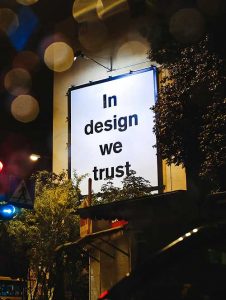
 I had the pleasure last week to attend a handful of sessions and events hosted by Denver StartUp Week. I mainly stuck to sessions which were related to my own field (Design & Product Tracks), while I intended to venture to a few sessions in the ‘maker’ track my schedule kept me from attending them. When picking tracks and sessions on the Denver StartUp Week website I immediately could tell which would be relevant to me, which might be a leap but interesting, and of course which I knew were not relevant to me or my goals.
I had the pleasure last week to attend a handful of sessions and events hosted by Denver StartUp Week. I mainly stuck to sessions which were related to my own field (Design & Product Tracks), while I intended to venture to a few sessions in the ‘maker’ track my schedule kept me from attending them. When picking tracks and sessions on the Denver StartUp Week website I immediately could tell which would be relevant to me, which might be a leap but interesting, and of course which I knew were not relevant to me or my goals.
I am not part of a startup company, or looking to create one, but saw the event as a networking opportunity and avenue to learn, grow, and take in opinions and views related to my craft. Expecting to hear my colleagues take on things from a different perspective was maybe a little hopeful, however, in a few sessions including one at Spire Digital titled Process is not a Dirty Word and lead by their Chief Product Officer, Nick Coppolo I was not let down. His presentation was definitely geared more towards beginners and business folks, versus people like me who are well into their careers in UX and Product Management, yet I was pleasantly surprised at how well he took what outsiders might see as complex tasks that holds so many companies, startups, and large corporations alike from launching successful apps and software based products and present it with simplicity.
While I only gained a few of insights on product development around how Spire manages their flow through a enhanced and mix matched process using parts and pieces from AGILE, SCRUM, and LEAN development techniques, some of their tactics on educating their clients that these steps, which from the outside seem like time and expense burners are worth it. What I really took away from the session was the powerful presentation skill which was derivative from his calmness, his extreme knowledge on the topic, and his ability to explain and breakdown the complexities in a way that any one of the people in the audience could ingest whether a CEO, Biz Dev, Developer, or Designer.
 I’ve had a few opportunities to speak at conferences. I can look back and admit that my presentations weren’t nearly as smooth. They were well received, but know for certain I did not speak as clearly or with the grace Nick had during his session. I did and do know the topics I spoke on well, think I too was able to represent complex methodologies simply, but know I did not command the audience like he did due to how I spoke and perhaps carried myself…nerves…I find myself to do well in small to medium groups for client pitches, leading discovery process, internal meetings, and similar, especially when comfortable with the information, but jumping up on stage with 100+ people looking on is a different beast.
I’ve had a few opportunities to speak at conferences. I can look back and admit that my presentations weren’t nearly as smooth. They were well received, but know for certain I did not speak as clearly or with the grace Nick had during his session. I did and do know the topics I spoke on well, think I too was able to represent complex methodologies simply, but know I did not command the audience like he did due to how I spoke and perhaps carried myself…nerves…I find myself to do well in small to medium groups for client pitches, leading discovery process, internal meetings, and similar, especially when comfortable with the information, but jumping up on stage with 100+ people looking on is a different beast.
Later in the week I went to an IoT (Internet of Things, for those that don’t know the acronym) session The Internet of Everything Competition (& Tech Titans), which was posed as a sort of shark tank pitch by 5 startups to a panel of judges including a billionaire business mogal, a local startup venture capitalist director, and a well known IoT journalist. Each of the companies got 3 minutes to pitch their concept and company. Then the judges got 60secs each to ask questions. I bring up this session as my experience watching made me analyze the session at Spire at an even deeper level.
Two of the five presenters did well overall, they weren’t as calm or as poised as Nick was, but got through their presentations without out losing their train of thought, successfully got across what their wares were, who their audience was, and what the impact of funding would do for their company. The other 3 struggled from the minute they hit the stage, bumbling on their own words, losing their train of thought, and failing to engaged the audience, which was just as important as the judges. The two that made it through their 3minutes well still struggled to answer the judges questions smoothly and with confidence. That part I get as pitching to the three of them with their status and potential to change their lives and company forever would be daunting.
 The next part while not related to speaking was also interesting in relation to the overall presentation factor. Each company was allowed to stream a deck to a TV for the audience, and assume the judges had hard copies, but don’t recall seeing the judges turning pages through them now that I think about it. All of them but one had absolutely awful desks, no design, or were over designed, with one fulfilling a designers nightmare having a biz dev teammate cram an essay on each slide in an eight point font no one in the audience could read. Yes, these were startups and one cannot expect them to have a design team, or even design skills of their own, but still amazing how nearly all the decks were seemingly afterthoughts and or just plain and simply awful attempts to express their goals and achievements, doing more damage than help. As a designer by trade those things stand out to me like a sore thumb, knowing the importance in relation to a successful presentation, but also know even those who don’t get it from a design standpoint were surprised too. After talking to a few people in the audience during intermissions many of my thoughts at the time and in this post were the common perception.
The next part while not related to speaking was also interesting in relation to the overall presentation factor. Each company was allowed to stream a deck to a TV for the audience, and assume the judges had hard copies, but don’t recall seeing the judges turning pages through them now that I think about it. All of them but one had absolutely awful desks, no design, or were over designed, with one fulfilling a designers nightmare having a biz dev teammate cram an essay on each slide in an eight point font no one in the audience could read. Yes, these were startups and one cannot expect them to have a design team, or even design skills of their own, but still amazing how nearly all the decks were seemingly afterthoughts and or just plain and simply awful attempts to express their goals and achievements, doing more damage than help. As a designer by trade those things stand out to me like a sore thumb, knowing the importance in relation to a successful presentation, but also know even those who don’t get it from a design standpoint were surprised too. After talking to a few people in the audience during intermissions many of my thoughts at the time and in this post were the common perception.
I think it is obvious and safe to say anyone who reads this will see why I ventured away from the speaking skills point to discuss other elements of a presentation like the deck, props, and similar items used to illustrate key points and purpose of the topic at hand. With that I have seen and do think a strong presentation can out-way the lacking in the secondary elements. I didn’t mention it before, but Nick’s slides, while they were solid, they were not stunningly designed either, the fonts were a bit small for the small screen which was for sure an issue for those reading from the back of the room 30 rows back.
One last point on presentation materials and only sort of related is there is nothing worse than a meeting, presentation, or webinar where the presenter simply reads the slides. I have, and assume many of you have sat through hour plus long meetings or similar where a vendor or partner has a 50 page deck that they read word for word like those watching cannot read. A slide deck for presentation sake should be for the audience, a tool to not get off track, and be a leave behind for the audience to revisit later.
I am not speaking coach, and not the best speaker in front of large audiences, but the experiences I had at the Denver StartUp week have me thinking on how to improve my own skills. Seeing one nailed, some managed, and some that were painful to watch, gives me added insights on how to better handle my next speaking engagement. I used to think prep meeting for pitches or presentations were goofy, not a good use of time, and always felt awkward, but at my next opportunity to rehearse I will take it much more seriously.






 Hello! My name is James Einspahr and I’m a Creative Director & Digital Strategist based in Denver, Colorado
Hello! My name is James Einspahr and I’m a Creative Director & Digital Strategist based in Denver, Colorado
No Comments on This Post